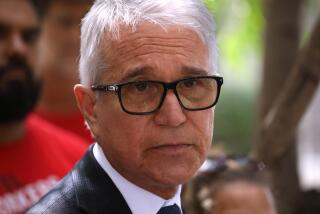2012 election: Los Angeles Times ballot endorsements, at a glance
With the final presidential candidate debate concluded and the deadline for voter registration passed, the last phase of the long 2012 election season has begun. The Times has completed endorsements for the Nov. 6 ballot, and reiterates those recommendations here.
President: Barack Obama. The economy remains sluggish, but the president is leading the nation through the tough times. He is a far better choice than challenger Mitt Romney, whose prescription seems always in flux but revolves around deep and damaging tax cuts for wealthy Americans.
U.S. Senate: Dianne Feinstein. In the Senate since 1992, Feinstein, a Democrat, is entrenched but effective. Republican challenger Elizabeth Emken offers little more than the traditional and unpersuasive conservative critique of the centrist incumbent.
House of Representatives, District 44: Janice Hahn. Thanks to the new top-two primary system, Hahn, a freshman Democrat, is pitted against Laura Richardson, a three-term incumbent from the same party. Hahn has yet to prove herself, but she’s by far the better choice than Richardson, who has been disciplined for ethical misconduct and can’t seem to get her professional or personal houses in order.
House of Representatives, District 30: Howard Berman. Neither Berman nor his rival, fellow congressional Democrat Brad Sherman, have done themselves, their party or their constituents any favors with their verbal and (almost) physical brawling, but of the two Berman is the cooler head and the more accomplished lawmaker.
House of Representatives, District 26: Julia Brownley. In Ventura County, Democrat Brownley is facing off against conservative Republican Tony Strickland. Brownley’s support for education reform, Medicare and abortion rights make her a better fit for California than the very conservative Strickland.
District attorney: Jackie Lacey. Los Angeles County voters are facing the first district attorney’s race in nearly half a century without an incumbent. The level-headed Lacey, with policymaking and administrative experience to complement more than a decade as a courtroom prosecutor, is the better choice over the more fiery Alan Jackson.
Measure A: No. Voters should reject a bid to make the office of county assessor appointed rather than elected. This purely advisory vote will accomplish little. The elected assessor, John Noguez, has been arrested on corruption charges, but that alone is no reason for voters to give up their oversight of this important office.
Measure B: No. On paper, this measure would require condom use in adult film productions, but the well-meaning ordinance would be nearly impossible to enforce.
Measure J: Yes. Extend the county’s half-cent sales tax for transportation projects another 30 years. Moving the tax’s expiration date from 2039 to 2069 would seem to have little effect today, but it would make it easier to sell bonds and get projects built.
Proposition 30: Yes. California should adopt these temporary sales and income tax increases to help fix the state’s fiscal problems. The state has cut billions in spending but must complete its emergence from its structural budget mess. The alternative — further cuts to K-12 schools, universities and other programs — would take the state in the wrong direction.
Proposition 31: No. This assortment of budget and governmental reforms, including local community action plans and a two-year budget cycle, is half-baked. These previously floated proposals and new ideas could make the state’s regulatory landscape even more unworkable by allowing local governments to substitute their own rules.
Proposition 32: No. Should political donations from corporations and unions be banned in California campaigns? The question asked by the proposition’s backers is misleading. If passed, this measure would undercut organized labor’s political power but would enhance the campaign clout of business groups.
Proposition 33: No. This measure would open up a loophole in California’s landmark auto insurance law by letting insurance companies entice customers away from their rivals. It pretends to be consumer-friendly, but actually would enhance the business model of just one company — Mercury Insurance.
Proposition 34: Yes. California should eliminate the death penalty and substitute life in prison without the possibility of parole. Death sentences are a game in California, handed down with no expectation that they will be carried out. Death penalty backers argue that California should cut through the red tape, but the truth is it’s not bureaucracy but rather the U.S. Constitution that keeps the death chambers dark.
Proposition 35: No. Human trafficking is a real problem that requires careful lawmaking and cooperation among federal authorities, law enforcement agencies and victim support groups, not this overly broad and inflexible initiative that would, among other things, expand the already unwieldy sex offender registry.
Proposition 36: Yes. The state should modify its three-strikes law so that 25-to-life terms are imposed for a third offense only if it is violent or serious. This common-sense reform corrects a flaw in the law that sent people to prison for life for petty offenses.
Proposition 37: No. This initiative to require labeling of products containing genetically modified ingredients is so sloppily written that it could impose severe burdens on grocers while misleading consumers because of various loopholes.
Proposition 38: No. This income tax hike to fund schools would not end the fiscal mess that caused the state to cut education funding in the first place, and it competes with the more fiscally responsible Proposition 30. The two are mutually exclusive.
Proposition 39: Yes. The state should require a single method of determining a corporation’s California tax liability. This measure would close a gaping loophole that provides incentives for companies that do business here to move operations out of state.
Proposition 40: Yes. Retain the Senate district lines drawn by an independent citizens commission. Independent redistricting is an important step forward for California.
More to Read
A cure for the common opinion
Get thought-provoking perspectives with our weekly newsletter.
You may occasionally receive promotional content from the Los Angeles Times.






